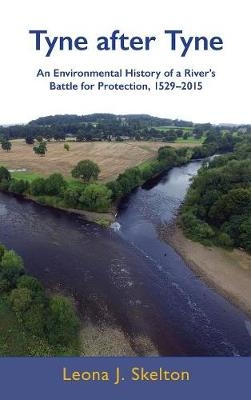
Tyne After Tyne
White Horse Press (Verlag)
978-1-874267-95-9 (ISBN)
Over the last five centuries, North-East England's River Tyne went largely with the flow as it rode with us on a rollercoaster from technologically limited early modern oligarchy, to large-scale Victorian 'improvement', to twentieth-century deoxygenation and to twenty-first-century efforts to expand the river's biodiversity. By studying five centuries of Tyne conservatorship, we can see that 1855 to 1972 was a blip on the graph of environmental concern, preceded and followed by more sustainable engagement and a fairer negotiation with the river's forces and expressions as a whole and natural system, albeit driven by different motivations. Even during this blip, however, many people expressed environmental concern. Several organisations, including the Tyne Salmon Conservancy (1866-1950), local governors, the Tyne's anglers and the Standing Committee on River Pollution's Tyne Sub-Committee (1921-1939), tried to protect the river's environmental health from harm, as they perceived it. This Tyne study offers a template for a future body of work on British rivers that shakes off the straitjacket of the Thames as the river of choice in British environmental history.
And it undermines traditional socio-cultural approaches which reduce rivers to passive backdrops of human activities. Departing from progressive narratives that equated change with improvement, and declensionist narratives that equated change with loss and destruction, it moves away from morally loaded notions of better or worse, and even dead, rivers. This book refocuses on the production of new and different rivers and fully situates the Tyne's fluvial transformations within their political, economic, cultural, social and intellectual contexts. Let us sit with the Tyne itself, some of its salmon, a seventeenth-century Tyne River Court Juror, some nineteenth-century Tyne Improvement Commissioners, a 1920s biologist, a twentieth-century Tyne angler, shipbuilder and council planner and some twenty-first-century Tyne Rivers Trust volunteers. What would they disagree about? Would they agree on anything? How would they explain their conceptualisation of what the river is for and how it should be used and regulated?
This book takes you to the heart of such virtual debates to revive, reconnect and reinvigorate the severed bonds and flows linking riparian places, issues and people across five centuries. By analysing the Tyne's past conservatorships, we can objectify ourselves through our descendants' eyes, reconnecting us not only to our past, but also to our future.
An environmental historian of water, rivers and sanitation infrastructure, Leona is Vice Chancellor's Research Fellow in the Humanities at Northumbria University in Newcastle. Her work focuses on the two-way interactions between people and the environment, developments in environmental attitudes and regulation and how dramatic environmental change has shaped economic, cultural and social lives and livelihoods across northern England and Scotland between 1500 and the present day. Her first monograph, Sanitation in Urban Britain, 1560-1700 (London: Routledge, 2015), investigated the regulation of bio-physical flows of water, manure, blood, urine and industrial waste products in early modern British townscapes, revealing remarkably well organised and effective systems of environmental regulation. Between 2012 and 2015, she contributed to two of Prof Peter Coates' environmental history research projects as a Research Assistant: 'The Places that Speak to Us and the Publics we Talk with' and 'The Power and the Water: Reconnecting Pasts with Futures'.
IntroductionOverviewRiver HistoriographyMethodology and Description of ChaptersChapter 1. 'Hurting the River of Tine': Protecting a Pre-Modern River Estuary, 1529-1850IntroductionEarly Modern Environmental HistoriographyThe Need for RegulationThe Foundations of RegulationThe Character and Stringency of RegulationConclusionChapter 2. 'Tinkering' the Tyne: Increasing Demand for Structural Change, 1655-1855IntroductionRalph Gardiner's Petition, 1655The Great Floods of 1771 and 1815The River Committee and Public Impatience for River Improvement, 1832-1850The Royal Commission of 1855ConclusionChapter 3. Creating a Grand and Deep River: The Tyne Improvement Commission, 1850-1968IntroductionThe TIC's Structure and PurposeDocks and PiersDredging for Industrial ProgressDredging for ResourcesStraightening the ChannelDomestic and Industrial WastesTesting and Attempts at RegulationThe TIC's Intervention in Non-Tidal ReachesConclusionChapter 4. Fish in the Tyne: The Tyne Salmon Conservancy, 1866-1950IntroductionThe Tyne Salmon Conservancy's WorkThe Consequences of Scientific ProgressTackling the Estuary's PollutionConclusionChapter 5. Testing the Troubled Waters: SCORP's Tyne Sub-committee and a Succession of Unsuccessful Reports, 1921-1945IntroductionA Thousand ReportsA Tyne Sewerage Scheme and the Joint CommitteeUnsuccessful ReportsConclusionChapter 6: 'A Medieval Street of Squalor': The Final Demand for a Clean-Up, 1950-1975IntroductionThe 1950s on TyneFinal Demands for a Clean-UpThe Tyneside Joint Sewerage Committee and the Howdon PlanStories from before the Clean-UpConclusionChapter 7. Damming the Tyne: The Creation and Impact of Kielder Reservoir, 1975-2015IntroductionThe Kielder Scheme and its Local Enquiries, 1972-1973The Fish Pass IssueConclusionChapter 8. 'A Big River?': Regeneration, Tourism and the Cultural Meaning of the Tyne, 1972-2015IntroductionIconography of the Newcastle-Gateshead QuaysideCreativity on TyneRiver Recreation Ecological ResponsibilityThe Tyne's Indomitable Natural IndependenceStories from after the Clean-UpConclusionConclusionBibliographyIndex
| Erscheinungsdatum | 25.02.2017 |
|---|---|
| Zusatzinfo | black and white illustrations, photographs, maps |
| Verlagsort | Knapwell |
| Sprache | englisch |
| Maße | 152 x 229 mm |
| Themenwelt | Geisteswissenschaften ► Geschichte ► Regional- / Ländergeschichte |
| Geschichte ► Teilgebiete der Geschichte ► Kulturgeschichte | |
| Naturwissenschaften ► Biologie ► Ökologie / Naturschutz | |
| Naturwissenschaften ► Geowissenschaften ► Geografie / Kartografie | |
| ISBN-10 | 1-874267-95-2 / 1874267952 |
| ISBN-13 | 978-1-874267-95-9 / 9781874267959 |
| Zustand | Neuware |
| Haben Sie eine Frage zum Produkt? |
aus dem Bereich


